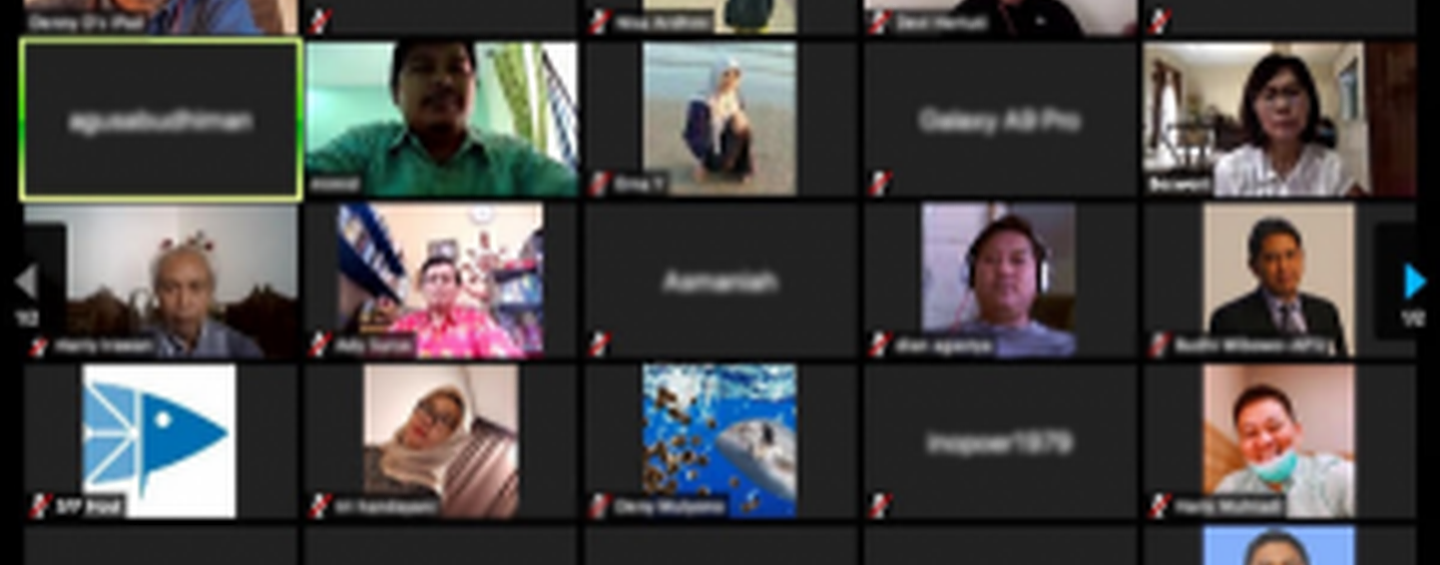Sustainable Fisheries Partnership (SFP) has a long-standing history of not only working closely with our market partners across the globe, but also of a strong presence “on the ground” in the countries where our sustainability work is focused. This rings especially true in Indonesia, where SFP has staff working in the field with the blue swimming crab, tuna, snapper and grouper, octopus, and fishmeal sectors. The field work is cross-cutting and includes many facets of government engagement, policy development, industry collaboration, and data collection and analysis. All of this work requires significant stakeholder coordination, often involving extensive travel throughout Indonesia to facilitate and participate in various in-person meetings. But what happens when you have a global pandemic that stops all of this face-to-face interaction and coordination in its tracks?
One of the central tenets of SFP’s work is the ability to be nimble and rapidly respond to emerging issues and situations in the seafood supply chain, through the cultivation of trusted partnerships with government agencies, other NGOs, and industry partners. As the COVID-19 crisis has developed, our first priority has been the health and safety of our staff and assessing ways to help our partners in the seafood supply chain respond to the crisis. Most of our markets-based partners are experiencing significant economic impacts as a result of disruptions in the supply chain. And many of our government partners are learning the “new normal” of transitioning to a work-from-home model and using new technology to still accomplish short- and long-term goals. SFP has been a virtual organization since our inception, so we were poised to quickly assist our stakeholders and partners in addressing the immediate crisis and also moving forward on current sustainability efforts.
Government officials, industry representatives, and fishers in Indonesia have risen to this new challenge of virtual meetings and continue to be active in the discussions surrounding sustainability improvements. Learning how to use Zoom and WhatsApp technology to their advantage, the SFP field team in Indonesia has shifted from the “old norm” of face-to-face meetings and pivoted to the “new norm” of convening and conducting virtual meetings with government officials, industry groups, and fisher groups.
SFP recently hosted a meeting with the Ministry of Marine Affairs and Fisheries (MMAF) to review and discuss improvements to the electronic logbooks submitted by vessels participating in the newly formed National Longline Tuna FIP. An added benefit of the meeting was that the virtual format resulted in higher participation by government officials than is typically seen at in-person meetings, which allowed for more thorough discussion and more viewpoints brought to the table. “We were surprised by the enthusiasm of the MMAF staff to attend, as participation by more than one or two staff is often constrained by limited resources and availability,” said Dessy Anggraeni, SFP’s Indonesia FIP director. “In attendance at the meeting were two heads of sub-directorates under the Director General of Capture Fisheries – the head of the Sub-Directorate of Monitoring and Analysis and the head of the Sub-Directorate of Fish Resources in EEZ and High Seas. These high-level officials provided valuable input to the discussions, and we established new connections within these offices for future work.”
SFP has also facilitated a virtual meeting between MMAF and fisher representatives from the newly established Indonesian Blue Swimming Crab Fishers Network, to introduce officials to the fishers network and gain government support to strengthen the network. Using the virtual technology was new for the fishers, but their vested interest in moving the network forward motivated them to take on the technology challenge and actively participate and provide input during this critical meeting with the government.
Our work with industry has also continued online, as we have had several meetings with the newly formed Indonesian Demersal Association (ADI), which is beginning to develop a national-level snapper and grouper FIP. In late April, SFP also convened a meeting of the Steering Committee of Indonesian Fishmeal, where a total of 28 government and industry participants gathered to discuss a plan to support development of fishmeal provisions for aquaculture production in Indonesia. Additionally, data collection efforts by enumerators in the field have also pivoted, from meeting fishers at the landing sites to collect catch data to collecting the data virtually using phone interviews, WhatsApp video calls and chats, and Google Photos to document and share crab landing data (size and volume).
The COVID-19 pandemic will have long-lasting impacts on public health and economies at a global scale, and SFP will continue to respond to the crisis and provide support to the seafood supply chain and its government and industry partners. Being adaptable to changing communications methods and able to facilitate virtual collaboration at the local and national level has provided us with opportunities to continue sustainability improvement efforts and has taught all of us a thing or two about getting creative and connecting on a new level to carry on with our work.

